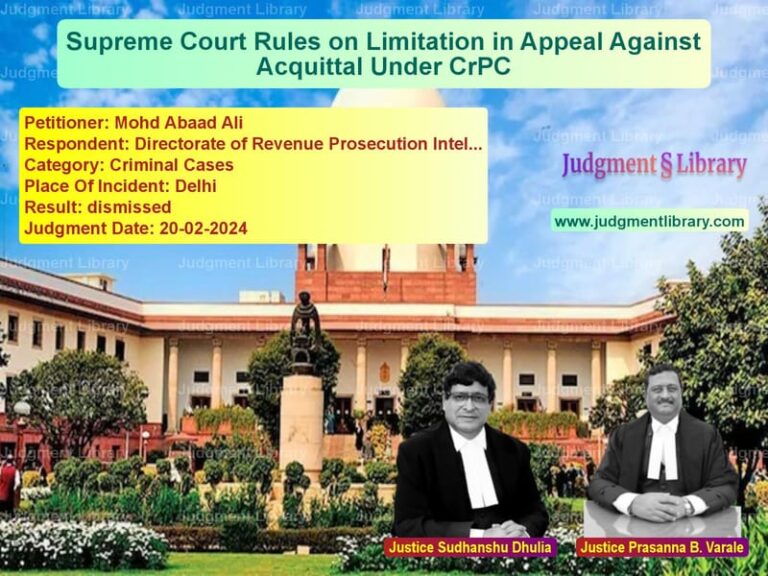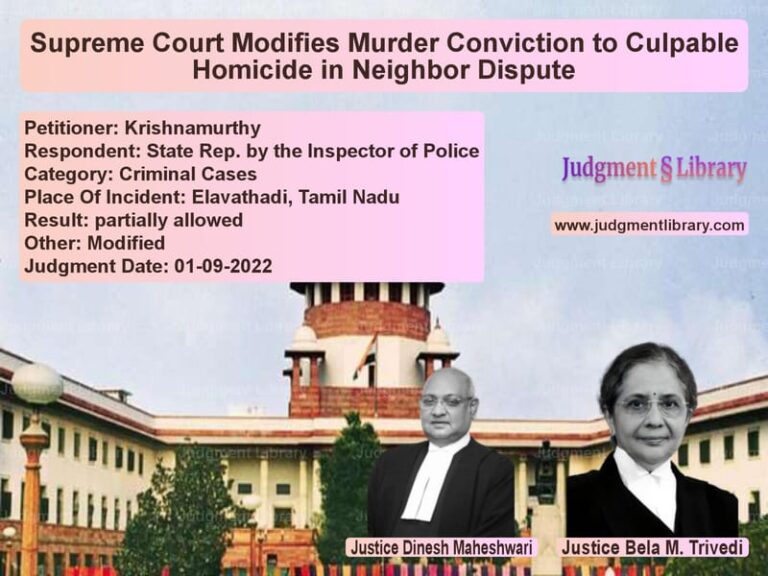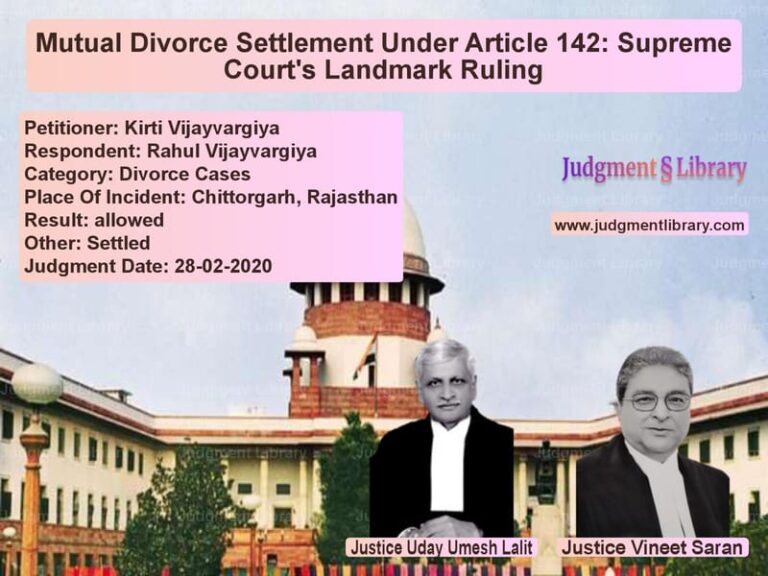Cheque Bounce Case: Supreme Court Acquits Partner Over Vicarious Liability
The Supreme Court of India recently delivered a significant judgment in the case of Dilip Hariramani vs. Bank of Baroda, which clarified the applicability of vicarious liability under Section 141 of the Negotiable Instruments Act, 1881 (NI Act). The case involved a cheque bounce dispute where the petitioner, a partner in a firm, was convicted under Section 138 of the NI Act for dishonored cheques issued by the partnership firm. The Supreme Court ultimately overturned his conviction, emphasizing that a partner cannot be held criminally liable unless the firm itself is made an accused in the case.
Background of the Case
The case stemmed from financial transactions between M/s Global Packaging, a partnership firm, and the Bank of Baroda. The firm had taken a loan of Rs. 6.73 crore from the bank in October 2012. In partial repayment of the loan, three cheques of Rs. 25 lakh each were issued on behalf of the firm by one of its partners, Simaiya Hariramani. However, these cheques were dishonored upon presentation due to insufficient funds.
The bank sent a demand notice under Section 138 of the NI Act but did not receive any payment. Subsequently, a criminal complaint was filed before the Judicial Magistrate, Balodabazar, Chhattisgarh, against two partners of the firm—Simaiya Hariramani and Dilip Hariramani (the appellant). Notably, the firm itself was not named as an accused in the case.
Key Legal Issues
- Whether a partner can be convicted under Section 138 of the NI Act if the partnership firm is not made an accused.
- Whether the vicarious liability under Section 141 of the NI Act applies to a partner in such a scenario.
- The scope of liability under the Partnership Act, 1932, and its intersection with criminal liability under the NI Act.
Arguments by the Petitioner (Dilip Hariramani)
The petitioner challenged his conviction on the following grounds:
- The cheques in question were issued by Simaiya Hariramani as the authorized signatory of the firm, and not by him.
- There was no evidence to establish that he was in charge of the day-to-day affairs of the firm or was responsible for issuing the cheques.
- Since the firm was not made an accused, a partner could not be convicted vicariously under Section 141 of the NI Act.
- He merely stood as a guarantor for the loan, and civil liability cannot be converted into criminal liability.
Counterarguments by the Respondent (Bank of Baroda)
The bank defended the prosecution on the following grounds:
- As a partner, the petitioner was responsible for the conduct of the firm’s business and was therefore liable under Section 141 of the NI Act.
- Both partners had furnished guarantees for the loan taken by the firm.
- The complaint clearly stated that the accused were partners of the firm, and therefore, their liability was established.
Supreme Court’s Observations
The Supreme Court analyzed the applicability of vicarious liability under Section 141 of the NI Act and emphasized:
“For maintaining prosecution under Section 141 of the Act, arraigning of a company or firm as an accused is imperative. The other categories of offenders can only be brought in the drag-net on the touchstone of vicarious liability.”
The Court referred to the landmark decision in Aneeta Hada vs. Godfather Travels & Tours (2012), which held that an individual cannot be prosecuted for a corporate offense unless the company or firm is also named as an accused.
Final Judgment
Based on its analysis, the Supreme Court ruled:
- The conviction of Dilip Hariramani under Section 138 read with Section 141 of the NI Act was set aside.
- The prosecution’s failure to include the firm as an accused invalidated the case against the petitioner.
- The mere fact that the petitioner was a partner did not establish his criminal liability.
- He was acquitted of all charges, and his bail bonds were canceled.
Impact of the Judgment
This ruling has significant implications for business owners and financial institutions:
- Clarification on Vicarious Liability: The judgment reaffirms that liability under Section 141 of the NI Act requires the firm to be named as an accused.
- Protection for Business Partners: Partners cannot be held criminally liable unless there is specific evidence of their role in the dishonored cheque transaction.
- Stricter Procedural Requirements: Prosecuting agencies must ensure that firms or companies are properly named as accused in cheque bounce cases.
- Impact on Banking Practices: Financial institutions may need to reassess how they enforce liabilities against partners in cases of default.
With this decision, the Supreme Court has reinforced the principle that criminal liability under the NI Act cannot be imposed without fulfilling the necessary statutory conditions. This case serves as a crucial precedent in cheque dishonor litigations involving partnership firms.
Petitioner Name: Dilip Hariramani.Respondent Name: Bank of Baroda.Judgment By: Justice Sanjiv Khanna, Justice Ajay Rastogi.Place Of Incident: Balodabazar, Chhattisgarh.Judgment Date: 09-05-2022.
Don’t miss out on the full details! Download the complete judgment in PDF format below and gain valuable insights instantly!
Download Judgment: dilip-hariramani-vs-bank-of-baroda-supreme-court-of-india-judgment-dated-09-05-2022.pdf
Directly Download Judgment: Directly download this Judgment
See all petitions in Cheque Dishonour Cases
See all petitions in Fraud and Forgery
See all petitions in Judgment by Sanjiv Khanna
See all petitions in Judgment by Ajay Rastogi
See all petitions in allowed
See all petitions in supreme court of India judgments May 2022
See all petitions in 2022 judgments
See all posts in Criminal Cases Category
See all allowed petitions in Criminal Cases Category
See all Dismissed petitions in Criminal Cases Category
See all partially allowed petitions in Criminal Cases Category







